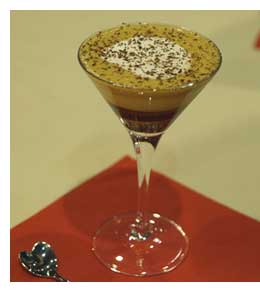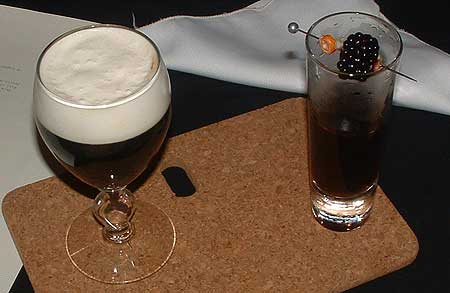Inside Beverages – Coffee cocktails
The Coffee in Good Spirits competition aims to encourage the profitable use of both coffee and alcohol in the same drink. Ian Boughton reports
A matter of constant discussion in the coffee trade is exactly where the art of the barista meets the art of the mixologist. One of the few places where the two do meet is in the Coffee in Good Spirits competition run by the Speciality Coffee Association of Europe.
The aim of this contest is to encourage the profitable use of both coffee and alcohol in the same drink, and this year's coffee cocktail champion is from the restaurant trade. He is Martin Ball, head bartender at Residence in Nantwich, who has beaten a series of competitors from the coffee trade and will now represent the UK in the world contest in Amsterdam later this year.
The contest requires entrants to make an Irish coffee and a coffee cocktail of the entrant's own devising and serve it to the four judges in eight minutes.
Martin Ball's recipe was for an aperitif based on the Negroni, which is gin, Campari and sweet vermouth. "Cocktails are all about balance," says Martin, "so I substitute coffee for the Campari, with 50ml gin, and 50ml Dubonnet. The coffee is Kenyan and has a citrusy taste; gin is citrus-led, so we have a balance there. We sell it for £5.95. It is commercially easy to make, and I expect at least 8% of that to be profit."
The Negroni would normally be served in a small glass - Martin's was served to the judges in a curious vessel, which he later confessed was a white candle holder from Ikea, used to hide the "dirty brown" colour of the drink and which by sheer chance matched the foam of the coffee!
Ed Buston, of Clifton Coffee in Bristol, has been the king of the coffee cocktail for some time, having been either champion or runner-up for the last four years. This year, he dropped to fourth position, having completely forgotten to put one ingredient in his drink. However, he is the barista who created a new version of the espresso martini with his Martini Potento, which was designed to be made up entirely of items found behind a standard cocktail bar.
"I start with a half-shot triple sec. On top of that goes a double espresso, and it is shaken with Tuaca vanilla liqueur. I layer that with double cream mixed with a half-shot of Frangelico hazelnut liqueur and a little almond liqueur, then top it with 100% Peruvian cocoa, and the zest of an orange.
"The first and last things you taste are orange, but not too much, and in the middle is a dessert-like nutty coffee."
Because it takes a couple of minutes to make, Ed suggests that this is best promoted as a very special cocktail dessert item, ideally offered in pairs for a couple… but the selling price, he says, is "as high as a bar dares pitch it"!
The espresso martini is a known drink and this year Richard Teasdale of Coffee Aroma in Lincoln served the Black Martini. He used a spicy and earthy Sumatran Madam Popa coffee, because "in a cocktail, your coffee cannot be too timid." He added equal measures of espresso, Mozart chocolate liqueur and Havana Club rum, infused with a vanilla pod, all shaken and garnished with grated white chocolate. The costs are minimal and he suggests that the sale price, in the right venue, could reach £8.
"The reason you don't find many successful coffee cocktails on sale," said Richard challengingly at the contest, "is because mixologists and barmen use top-notch spirits, but any old coffee. Treat coffee as a fresh food - if you use rubbish coffee, you'll get a rubbish cocktail."
Victor Frankowski, of the Tapped and Packed coffee house in London, mixed Calvados and vodka with raspberries, orange and grapefruit, which he heated and reduced over a flame. The reduced alcohol mixture went into pre-iced tall slim glasses, followed with 50ml of espresso, and garnished with fruit on sticks. It is, he said, a perfectly viable commercial drink, selling profitably at about £4.
THE IRISH COFFEE
The basic part of the Coffee in Good Spirits contest is the making of an Irish Coffee - and every barista agrees that this is nowhere near as easy as it sounds. Indeed, it was reported in Ireland some months back that the standard of the drink in Irish airport bars, where it was first invented, had fallen sufficiently low to be causing some national embarrassment. Almost invariably, baristas prefer to make it with a filtered coffee, not an espresso, but there, the preferences of this year's contestants diverged.
Ed Buston says: "The key to an Irish Coffee is balance - a good key to any coffee cocktail is to start with equal measures, one shot of alcohol to one shot of espresso, because the temptation is always to put more alcohol in. I use a Bolivian coffee, through an Aeropress, which is a quick and easy filter method. I use Lockes whiskey… because my local off-licence recommends it!"
Richard Teasdale: "It's very easy to get an Irish Coffee wrong. Sugar is a critical point, because it changes the viscosity of the coffee". Teasdale's method is to put spicy Sumatran coffee with two shots of Bushmills whiskey into a Chemex coffee filter with a quickly-made muscovado sugar syrup.
Victor Frankowski used a full-bodied Papua New Guinea coffee and the standard method of creating a white sugar syrup which goes into the glass first, before the unusual Monkey Shoulder whisky, which is registered by the Glenfiddich Distillery in Dufftown.
All baristas agree that "any old coffee" just will not do. The two critical points are to assess the qualities of the whiskey, and then choose a coffee that works with it. Having done that, the rest can be handled at speed, says Martin Ball, who opts for Jameson's whiskey. "In a busy bar, you know you have to bang drinks out as quick as you can, and if you make an Irish Coffee cleverly, you can put it out in under a minute. I would expect an Irish Coffee to sell anywhere from £4 upwards, at an 80% margin."












